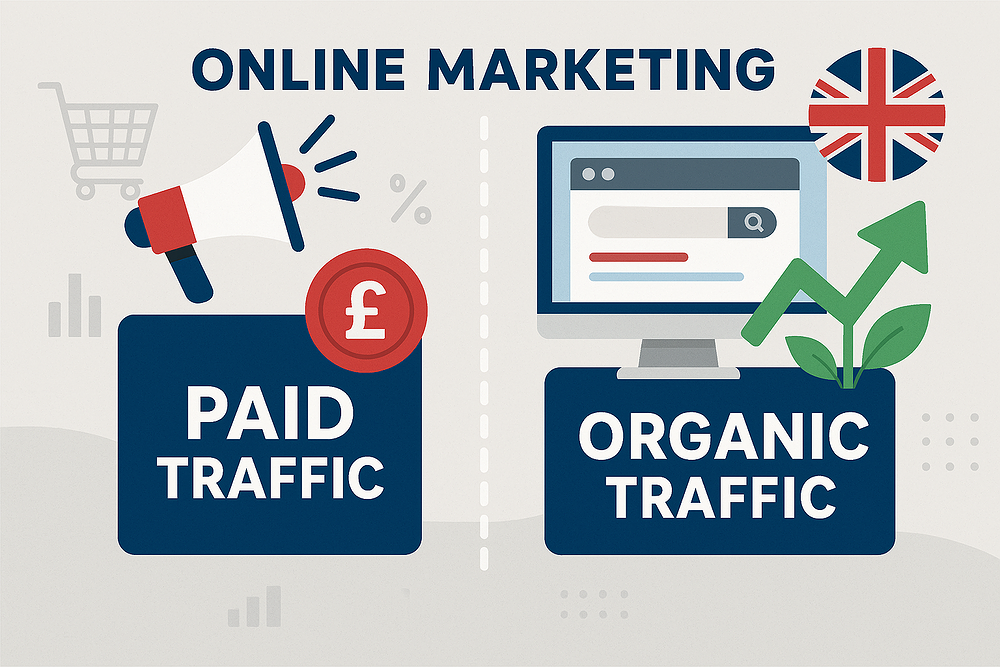5 Online Marketing Strategies Proven to Grow UK SMEs

In today's digital landscape, effective online marketing isn't just an option for small and medium-sized enterprises (SMEs) in the UK—it's essential. With limited budgets and resources compared to larger corporations, UK SMEs need marketing strategies that deliver maximum impact without breaking the bank.
Based on our experience helping businesses across the UK transform their digital presence, here are five online marketing strategies that consistently deliver impressive results for SMEs.
1. Local SEO: Becoming Visible Where It Matters Most
For UK SMEs, especially those serving specific geographic areas, local Search Engine Optimisation (SEO) represents one of the most cost-effective marketing strategies available.
Why it works for UK SMEs:
- 46% of all Google searches have local intent
- 88% of consumers who conduct local searches on their smartphone visit a related store within a week
- Local SEO typically delivers higher conversion rates than broader campaigns
Implementation steps:
- Claim and optimise your Google Business Profile (formerly Google My Business)
- Ensure consistent NAP (Name, Address, Phone Number) information across all online directories
- Generate authentic reviews from satisfied customers
- Create localised content that addresses the specific needs of your community
- Build relationships with other local businesses for backlinking opportunities
A Manchester-based accountancy firm we worked with saw a 67% increase in qualified leads after implementing a focused local SEO strategy. They now appear prominently when potential clients search for "accountants in Manchester," driving highly convertible traffic to their website.
2. Content Marketing: Becoming a Trusted Authority
Content marketing allows SMEs to demonstrate expertise and build trust without the aggressive selling tactics that often turn customers away.
Why it works for UK SMEs:
- Creates multiple entry points to your website through search engines
- Builds authority and trust with potential customers
- Supports other marketing efforts by providing valuable content to share
- Continues working for you long after publication (unlike paid advertising)
Implementation steps:
- Identify the questions and challenges your customers face
- Create a content calendar addressing these topics
- Mix content formats (blog posts, videos, infographics, case studies)
- Focus on quality over quantity—well-researched, valuable content outperforms thin, hastily created material
- Distribute your content through multiple channels
One retail client saw a 43% increase in organic traffic after committing to publishing just two high-quality blog posts monthly. Their approach focused not on selling products directly but on helping customers solve problems related to their industry.
3. Email Marketing: The Highest ROI Channel
Despite predictions of its demise, email marketing remains one of the most powerful tools for UK SMEs, consistently outperforming other channels in terms of return on investment.
Why it works for UK SMEs:
- Average ROI of £42 for every £1 spent, according to the UK Data & Marketing Association
- Direct communication channel that isn't subject to algorithm changes
- Highly personalised targeting capabilities
- Measurable results and easy A/B testing
- Builds ongoing relationships with prospects and customers
Implementation steps:
- Build your email list ethically through valuable opt-in incentives
- Segment your audience based on behaviour and preferences
- Create a welcome sequence for new subscribers
- Balance promotional content with valuable information
- Use automation to deliver timely, relevant messages
A Bristol-based software company we support achieved a 28% increase in repeat business by implementing a simple customer onboarding sequence and quarterly check-in emails. These automated yet personalised touchpoints kept their brand top-of-mind and opened doors for additional services.
4. Social Media Marketing: Strategic Engagement, Not Just Presence
Many UK SMEs make the mistake of trying to maintain a presence on every social platform. The most successful approach, however, focuses on strategic engagement on the platforms where your specific audience spends their time.
Why it works for UK SMEs:
- Allows for direct engagement with customers and prospects
- Provides platforms for showcasing your expertise and personality
- Offers targeted advertising with precise demographic options
- Creates opportunities for user-generated content and community building
- Enables social listening to understand customer sentiment
Implementation steps:
- Research where your specific audience spends their time online
- Focus on 1-2 platforms rather than spreading yourself too thin
- Create a content strategy that balances promotional posts with engaging, shareable content
- Allocate time for genuine engagement, not just broadcasting
- Consider small budget allocations for targeted advertising to boost key content
A specialty food retailer in Edinburgh found tremendous success focusing exclusively on Instagram rather than maintaining multiple half-hearted social presences. By showcasing their products with compelling visuals and stories about their suppliers, they built a passionate community that drove a 56% increase in website traffic and significant sales growth.
5. Conversion Rate Optimisation: Making Your Existing Traffic Work Harder
Before investing heavily in driving more traffic, smart UK SMEs focus on converting more of their existing visitors into customers.
Why it works for UK SMEs:
- Maximises the value of traffic you've already earned or paid for
- Provides concrete data for decision-making
- Often delivers faster results than strategies focused on generating new traffic
- Creates compounding benefits when combined with traffic-growth strategies
Implementation steps:
- Install analytics to understand current user behaviour
- Identify the most important conversion points on your website
- Create clear, compelling calls-to-action
- Simplify forms and checkout processes
- Implement A/B testing to continually improve performance
- Add social proof elements like testimonials and case studies
A London-based consultancy increased their lead conversion rate by 82% by simply redesigning their contact form, adding testimonials strategically placed near conversion points, and creating a more compelling service description page. These changes required minimal investment but dramatically improved business outcomes.
Bringing It All Together: The Integrated Approach
While each of these strategies can deliver results independently, the most successful UK SMEs implement them as part of an integrated approach where each element supports the others. Your content marketing feeds your social media and email campaigns; your SEO drives traffic to optimised pages; your email marketing nurtures leads generated through all channels.
The digital marketing landscape continues to evolve, but these five strategies have consistently demonstrated their effectiveness for UK SMEs across diverse industries. By implementing them with a focus on your specific business goals and customer needs, you can achieve sustainable growth without the massive marketing budgets of larger competitors.
Remember that consistency and measurement are key—track your results, learn from the data, and continuously refine your approach based on what's working for your unique business.
Need help implementing these strategies for your business? Our team specialises in helping UK SMEs develop and execute effective online marketing campaigns tailored to your specific goals and resources. Contact us today to discuss how we can help grow your business.
Talk to us about your next project
Our team of experts is ready to help bring your ideas to life with solutions tailored to your business.
Get in Touch

